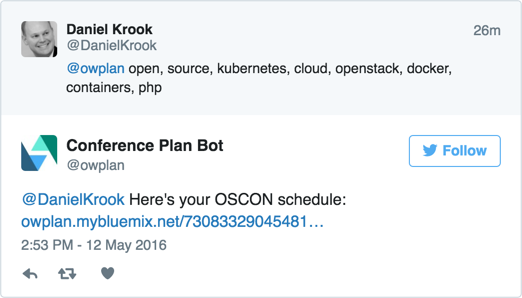The Conference Plan Bot is a serverless, event-driven, bot built on the OpenWhisk open source project.
An instance is running on the hosted OpenWhisk environment provided by IBM Bluemix. It has an associated Cloud Foundry app at http://owplan.mybluemix.net/ which provides the schedule UI, and two proxy services for handling Twitter integration and IoT device reading API calls.
The bot is designed to reply to user tweets that request conference schedule information with real time data on sessions and room conditions. It's currently configured for the O'Reilly Open Source Convention (OSCON) which runs from May 16th to May 20th.
For example, if you tweeted @owplan with the keywords "serverless, bot, Docker, containers" you'd get back a list of sessions at OSCON conference matching those terms for each day.
You can read more about bots, serverless programming, and the motivation for the Conference Plan Bot on the blog post at developerWorks Open.
Detailed instructions are pending. This repository is meant to provide examples of reusable code and approaches to building OpenWhisk based bots, rather than completely working code with all dependencies.
For now, explore devops/create-update-actions.sh and the individual action code in the openwhisk/actions/js folder. These describe the microservices built for the demo, and represent actions of moderate complexity that are broken into several files and use promises to handle asynchronous processing.
Your primary workflow after setup will be editing actions in JavaScript, compiling them if they consist of more than one file (or have third party NPMs not provided by your OpenWhisk environment), and uploading them.
To get started with an OpenWhisk bot running on Bluemix, you will need to do the following:
- Provision prerequisite services
- Log into Bluemix, request access to OpenWhisk (if still in a closed beta)
- Create two services. Free tiers are sufficient for both. You can create them directly in Bluemix or via the service provider directly.
- Cloudant - Provides a NoSQL database for the three Cloudant databases:
room,schedule, andtweet. - SendGrid - Provides an email interface for Twitter which can then invoke the
tweet-fetchaction.
- Cloudant - Provides a NoSQL database for the three Cloudant databases:
- Create a Twitter account for your bot and an associated application in order to use the API.
- Work with the OpenWhisk code
git clonethis repository.- Option 1: Set up a development environment with Vagrant
cdto theowplan/devopsfolder- Run
vagrant up vagrant sshto the node- Install the OpenWhisk CLI
- Review the NPM packages that you might have to install in
devops/setup-workstation.sh
- Option 2: Set up a development on your Mac/Windows/Linux workstation
- Install the OpenWhisk CLI
- Review the NPM packages that you might have to install in
devops/setup-workstation.sh
- Modify the configuration files and settings for each action.
- Cloudant - The
cloudant-config.jsonfile within each relevant action folder. - Twitter - The
twitter-config.jsonfile within each relevant action folder. - Replace each instance of
user@example.org_spacefor your Bluemix account.
- Cloudant - The
- Run the builds and install the OpenWhisk actions with
devops/create-update-actions.sh - Verify actions, triggers, rules with
wsk action listwsk trigger listwsk rule list
- Work with the associated Cloud Foundry application
- Create the Cloud Foundry app on Bluemix, which provide the schedule UI for the bot to link to.
- Install the Cloud Foundry CLI
- Go to the
webdirectory, modifyweb/manifest.ymlas needed - Run
cf pushto upload the PHP application to Bluemix.
- Create the Cloud Foundry app on Bluemix, which provide the schedule UI for the bot to link to.
- Set up the Arduino device
- Procure an Arduino UNO R3, WiFi shield, and Digital Hygrometer/Thermometer.
- Assemble the hardware.
- Install the Arduino IDE for your workstation or VM
- Load the
iot/room/room.inofile, edit the WiFi settings and your Bluemix app endpoint, then verify and upload it to the Arduino via USB. - Make sure it's emitting data and your proxy app is collecting data.
- The actions in a sequence are currently invoked manually from within each microservice. This could be done as a sequence to decouple the linkage of actions, but we'd have less control over error handling. Cloudant could also be used more completely as a state machine to trigger actions, but we moved away from that approach to improve performance.
- Twitter does not integrate well with Twilio for sending text messages for incoming mentions. Therefore we use a SendGrid managed email address to achieve a similar goal of notification when a tweet is received.
- There is still a need for a Bluemix Cloud Foundry app to provide the complex schedule UI and proxy requests to the Cloudant database from the Arduino sensors and from SendGrid. The proxies could be replaced by API Connect, API Registration, or Watson IoT services from the Bluemix catalog. The big challenge is handling SSL and mapping API requests directly to the OpenWhisk API.
- Complete the installation instructions, including how to download dependencies not included in this repository.
- Move strings and other OSCON specifics to properties files to enable reusability for other events.
- Add sparklines to show room temperature trends over time, as a way to predict some room conditions in the future, such as baseline temperature at a certain hour.
See CONTRIBUTING.md for details.
See LICENSE for details. This demo is built with dependencies on several NPM packages, Bootstrap, and Arduino hardware libraries. You'll need to include those separately to build a working instance of this bot.
